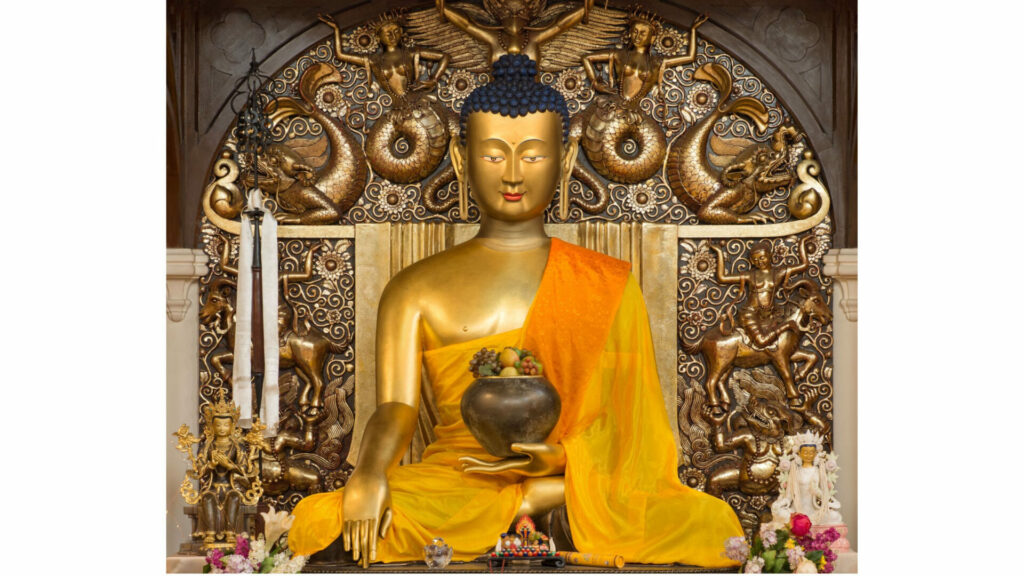Buddhism is a profound philosophy that offers insights into the nature of reality and the human condition. It originated around 2,500 years ago in ancient India and has since spread across the globe, becoming one of the major world religions. This blog series is an easy-to-understand introduction to the basics of Buddhism and an overview of the Buddhism’s core philosophy.
In this first post will answer your top questions about Buddhism and Buddhist Philosophy and also provide recommendations for places in London where you can immerse yourself in studying Buddhist philosophy.
- What is Buddhism?
- Is Buddhism a culture?
- Is Buddhism a religion?
- Is Buddhism a form of psychotherapy?
- Is Buddhism a philosophy?
- Which university was the centre of Buddhist philosophy?
- What is the main philosophy of Buddhism?
- What are the 3 main Buddhist beliefs?
- Where can I find Buddhist Philosophy groups in London?

What is Buddhism?
Buddhism is built on the wisdom of Buddha’s awakening in meditation to the way things are. Alongside meditation, Buddha dedicated his life to teaching others to live morally and ethically and discern truth from falsehood. He taught that their practice transforms one’s mind, and, in turn, one’s life.
Is Buddhism a culture?
Buddhism’s history, spanning 2,500 years, shows a rich cultural identity of art, music, architecture, literature, cuisine and language.
Is Buddhism a religion?
Though non-theistic, Buddhism shares various religious themes seen in other traditions. There is the community of practitioners, the sangha. The community’s founding principles are compassion and kindness towards all beings – part of the Buddha’s teachings, known as the dharma. The Sangha, Buddha’s life and the Dharma, are called the three jewels.
Is Buddhism a form of psychotherapy?
In the same way psychotherapy finds a cause for behaviour affecting a person’s wellbeing, Buddha teaches a system of cause and solution. He reasoned that if there is a cause of suffering, there is a solution and, by identifying the cause, the solution presents itself. Meditation is the tool for unpacking this process.
Is Buddhism a philosophy?
Yes, teaching freedom from suffering amidst our lives. This consists of upholding an ethical life, a meditation practice and following the dharma.
Which university was the centre of Buddhist philosophy?
Nalanda University near Rajagriha, India. Believed to be the oldest university in the world, it was located near the city of Rajagriha, operating from 427 until 1197 CE. Nalanda University ran six major Buddhist schools and philosophies as well as maths, grammar, and science courses.

What is the main philosophy of Buddhism?
The main philosophy of Buddhism is that life is suffering – beliefs, attitudes and perceptions mistaken for reality. Actions rooted in suffering create karma, the accumulation of intentions, habits and effects of actions. Karma is carried across lifetimes and determines what one will be reborn as in their next life – called reincarnation. The Buddha’s practical teachings such as meditation, serve as the means for putting an end to suffering, karma and rebirth and awakening to the same truth.

What are the 3 main Buddhist beliefs?
The three main Buddhist beliefs are impermanence, suffering and no-self. Impermanence teaches all phenomena are subject to change, suffering is not accepting the impermanence of things, and no-self states there is no unchanging self and that our identity is conditioned and impermanent.
Where can I find Buddhist Philosophy groups in London?
London is an important hub for Buddhism – a 2011 census reported that 34% of people who practice Buddhism lived in London. A variety of options are available in London for deepening dive into Buddhist philosophy. Informal gatherings to discuss the Buddha teachings are available on Eventbrite, Buddhist Centres in London are an additional alternative for whom want to know more about the Buddha teaching directly from Buddhist monks, recognised teachers or practice with a community of peers.
Buddhist Studies at Jamyang London Buddhist Centre
Jamyang London Buddhist Centre was established in 1978 and follows the teachings and practices of Tibetan Buddhism. It runs Buddhist courses ranging from beginner level to advanced and is focused on secularising the Dharma and reconciling it with other religions and science.
Jamyang’s courses and classes on Buddhist philosophy and practice rely on a skilled teacher to bring them to life. The supremely qualified Resident Teacher, Geshe Tenzin Namdak. He began studying Buddhism at Maitreya Institute and was eventually ordained by His Holiness the Dalai Lama before completing the 20-year Geshe degree at Sera Jey monastic university in India, as well as the traditional one-year Vajrayana study program at Gyume Tantric College; very few people can combine this extensive Buddhist education with rigorous scientific training.
If you’re interested to discover what Buddhism is, check out our upcoming Buddhist courses and events.
Author: Lewis Gwilt





